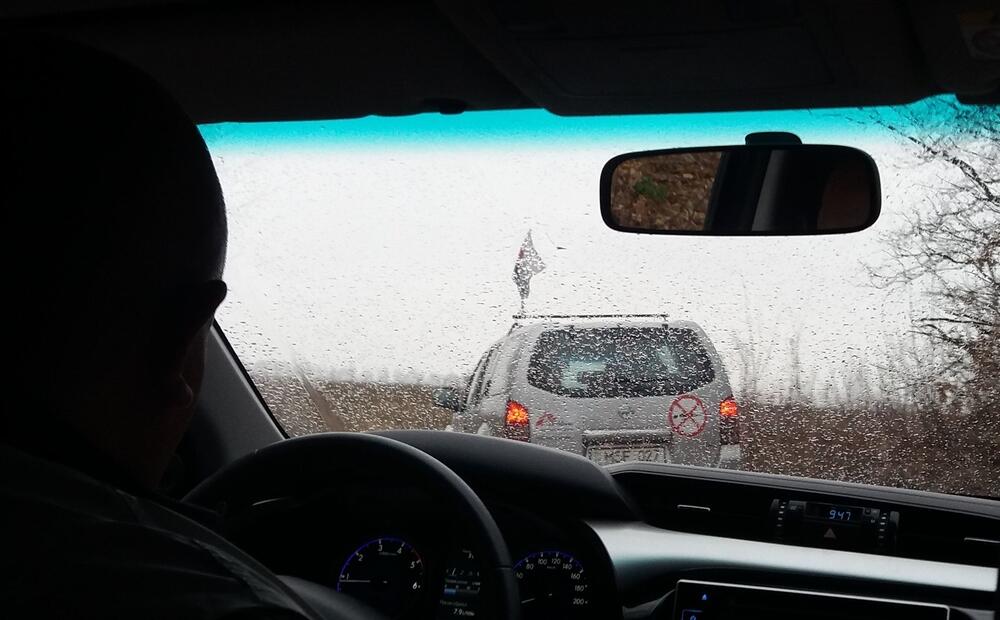Ukraine: How MSF is working to reach the worst-hit areas
In Ukraine, the number of people killed or injured in the conflict is rising, as hundreds of thousands more continue to seek refuge in neighbouring countries.
Médecins Sans Frontières / Doctors Without Borders (MSF) teams are working to get staff and equipment into the areas most affected by the fighting.
Bérengère Guais, deputy head of emergency programmes for MSF in Paris, explains the challenges and difficulties of deploying a response in Ukraine.
How is MSF working in Ukraine?
MSF has been present in Ukraine for many years to provide care for people affected by tuberculosis and HIV.
So, we already have national and international staff on the ground.

Help us prepare for the next emergency
Today, in the context of conflict, we have had to suspend these programmes and to reorient our activities to meet the medical needs generated by a large-scale military conflict.
We are switching to an emergency intervention from a routine medical project. We must therefore adapt our human resources and call on emergency specialists to be able to work with the people affected by the conflict in the worst-hit areas.
This is our priority at the moment.
What is your main challenge?
The most important challenge today is the identification of access points to the regions most affected by the fighting.
Since Monday 28 February, we have had teams in all the neighbouring countries – Poland, Moldova, Romania as well as in Russia and Belarus. Due to the chaotic situation on Ukraine's borders, with hundreds of thousands of people fleeing the fighting, it is difficult to understand which border crossings are the best to enter the country.
We are looking to bring in equipment and staff – including surgeons – to back up the staff already on the ground and be operational as quickly as possible.
How are you getting supplies into the country?
We are currently preparing kits of medical equipment and medicines from our logistical bases, notably in Brussels and Bordeaux, which will transit through neighbouring countries before entering Ukraine.
We are also purchasing goods and materials in Poland to make up kits for some local associations that have already informed us of a number of essentials that they lack.
To receive orders within Ukraine, we are setting up storage space in the west of the country. Depending on developments and opportunities, we will try to set up such warehouses in other areas to expand our supply capacity.
How do you assess the needs on the ground?
The combat zones are moving quickly, changing hourly. It is important for us to have a good understanding of the dynamics of the conflict, to assess the needs, but also not to put our teams at risk.
We have MSF staff in the capital Kyiv and in several key cities such as Zhytomyr, Severodonetsk, as well as a network of medics in hospitals and health centres in multiple locations who are enabling us to start building a picture of the needs.
In particular, we are gathering information about the number of people injured, how they are getting injured, and the capacity for care on the ground to build an appropriate medical response.
Are there ‘forward medical posts’? How is the referral of injured people carried out? Is it possible for patients to be transferred from one hospital to another? Which hospital structures could we quickly start activities with, especially surgical ones?
These are the main questions we are asking ourselves and to which we are trying to get reliable, clear and detailed answers.
This shipment of medical supplies left Brussels with 3 trucks and 100+ tons of kits, inc:
— MSF UK (@MSF_uk) March 2, 2022
➡️surgical/trauma kits
➡️chronic disease meds
➡️mass casualty supplies
As our limited stocks in Ukraine deplete, the arrival of new supplies will trigger a new phase of emergency response. pic.twitter.com/MkwFJihddW
What support are you providing for refugees in border areas?
We have already donated essential items to a reception centre in Poland and we are working to scale up our response. We are planning to deploy medical support and increase the distribution of blankets and hygiene kits.
But, we are already seeing a lot of local and international solidarity with the refugees, meaning their needs are well covered for the moment.
Our priority is therefore to take care of the injured in Ukraine.
Can I donate to support MSF's work in Ukraine?
Thanks to the generosity of people like you donating to our general funds, we haven't needed to launch an appeal for our work in Ukraine and surrounding countries.
Please consider giving an unrestricted donation, which will give our medical teams across the world the valuable flexibility to respond as needs arise.
Visit the following page to learn more.
Please visit the following link should you wish to donate to our general funds.
MSF in Ukraine
Prior to the outbreak of war in Ukraine, MSF had been working in the country since 2014.
In Donetsk region, we worked with local volunteers, organisations, healthcare professionals and authorities to help people travel to healthcare facilities, access prescribed medications and raise awareness about common health challenges.
Our teams also trained and supported family doctors and community nurses to offer basic mental healthcare to their patients. In Luhansk region, we ran a project focusing on HIV.
Elsewhere in Ukraine, we worked to show that it is possible to successfully treat patients with drug-resistant tuberculosis through a combination of a short course of newer medications, psychological counselling and social support.
Sadly, on 25 February 2022, we made the decision to halt our activities, doing all we could to ensure some continuity of care for our patients.
